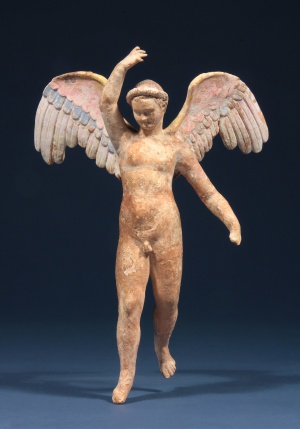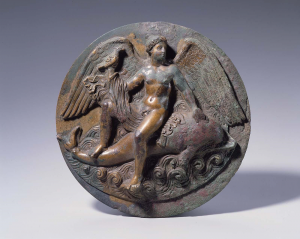(Boylove Documentary Sourcebook) - Pederastic Desire in a Poem by Rhianus: Difference between revisions
(Dandelion moved page (BLSB) - Pederastic Desire in a Poem by Rhianus to Pederastic Desire in a Poem by Rhianus) |
(Replaced the redirect code with the new content of the page) |
||
| Line 1: | Line 1: | ||
# | [[File:Figurine of Flying Eros.jpg|thumb|center|Figurine of Flying [[Eros (mythology)|Eros]]. [[Ancient Greece|Greek]], Hellenistic period, ca. 200–130 BCE. Probably made at Myrina (Modern Greece). Terracotta. Columbia, University of Missouri, Museum of Art and Archaeology, 81.2.]] | ||
From <i>The Boyish Muse</i> (Ancient Greek: Μοῦσα Παιδική <i>Mousa Paidike</i>; Latin: <i>Musa Puerilis</i>, 2nd Century AD), a collection of [[Homoerotic (dictionary)|homoerotic]] poetry assembled by [[Straton of Sardis|Strato]], in <i>The Greek Anthology</i>, Volume 4, translated by W. R. Paton, <i>Loeb Classical Library</i> (London: William Heinemann; Cambridge, Massachusetts: Harvard University Press, 1918). | |||
<div style="margin:.5em auto; width:95%; min-height:5em; background-color:#F5FAFF; border:3px solid #c9c9ff; padding:1em;"> | |||
<center>93.—RHIANUS</center> | |||
Boys are a labyrinth from which there is no way out; for wherever thou castest thine eye it is fast entangled as if by bird-lime. Here Theodorus attracts thee to the plump ripeness of his flesh and the unadulterate bloom of his limbs, and there it is the golden face of Philocles, who is not great in stature, but heavenly grace environs him. But if thou turnest to look on Leptines thou shalt no more move thy limbs, but shalt remain, thy steps glued as if by indissoluble adamant; such a flame hath the boy in his eyes to set thee afire from thy head to thy toe and finger tips. All hail, beautiful boys! May ye come to the prime of youth and live till grey hair clothe your heads. | |||
</div> | |||
[[File:Mirror cover with winged Eros.png|thumb|center|Mirror cover with winged Eros. Bronze. Greek, Early Hellenistic Period, about 300 B.C. Boston, Museum of Fine Arts, 98.671a.]] | |||
==See also== | |||
*[[Athenian pederasty]] | |||
*[[Cretan pederasty]] | |||
*[[Ephebophilia]] | |||
*[[Erastes]] | |||
*[[Eromenos]] | |||
*[[Greek love]] | |||
*[[Historical boylove relationships in ancient Greece]] | |||
*[[Philosophy of ancient Greek pederasty]] | |||
*[[Spartan pederasty]] | |||
*[[Theban pederasty]] | |||
==External Links== | |||
*[https://archive.org/details/greekanthology04newyuoft/page/326 The Greek anthology (Internet Archive)] | |||
*[https://greek-love.com/antiquity/greek-practices/pursuit-and-flight-by-sir-kenneth-dover <i>PURSUIT AND FLIGHT</i> BY SIR KENNETH DOVER (Greek Love Through the Ages)] | |||
*[https://greek-love.com/antiquity/greek-practices/greeks-pedicate-loved-boys-pederasty DID THE GREEKS PEDICATE THEIR LOVED BOYS? (Greek Love Through the Ages)] | |||
[[Category:Boylove Sourcebook]] | |||
[[Category:Reference material on ancient Greece]] | |||
[[Category:Greek literature]] | |||
[[Category:Poetry]] | |||
Revision as of 08:57, 15 August 2019

From The Boyish Muse (Ancient Greek: Μοῦσα Παιδική Mousa Paidike; Latin: Musa Puerilis, 2nd Century AD), a collection of homoerotic poetry assembled by Strato, in The Greek Anthology, Volume 4, translated by W. R. Paton, Loeb Classical Library (London: William Heinemann; Cambridge, Massachusetts: Harvard University Press, 1918).
Boys are a labyrinth from which there is no way out; for wherever thou castest thine eye it is fast entangled as if by bird-lime. Here Theodorus attracts thee to the plump ripeness of his flesh and the unadulterate bloom of his limbs, and there it is the golden face of Philocles, who is not great in stature, but heavenly grace environs him. But if thou turnest to look on Leptines thou shalt no more move thy limbs, but shalt remain, thy steps glued as if by indissoluble adamant; such a flame hath the boy in his eyes to set thee afire from thy head to thy toe and finger tips. All hail, beautiful boys! May ye come to the prime of youth and live till grey hair clothe your heads.

See also
- Athenian pederasty
- Cretan pederasty
- Ephebophilia
- Erastes
- Eromenos
- Greek love
- Historical boylove relationships in ancient Greece
- Philosophy of ancient Greek pederasty
- Spartan pederasty
- Theban pederasty